英语语法——动词的形式与时态
闽教版小学英语全册语法知识
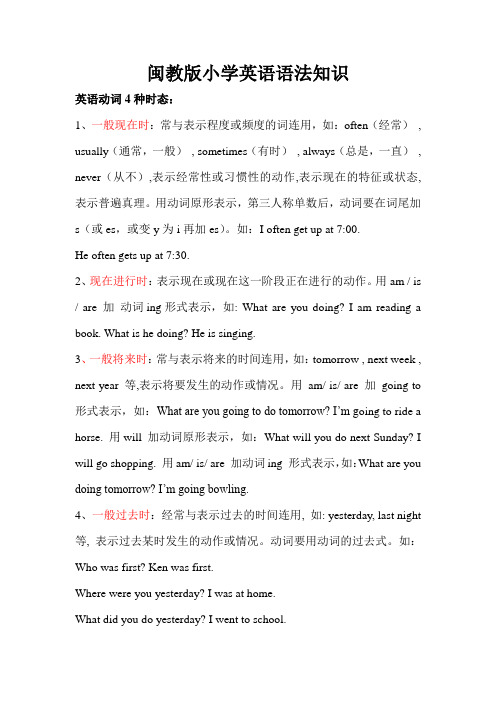
闽教版小学英语语法知识英语动词4种时态:1、一般现在时:常与表示程度或频度的词连用,如:often(经常), usually(通常,一般), sometimes(有时), always(总是,一直), never(从不),表示经常性或习惯性的动作,表示现在的特征或状态,表示普遍真理。
用动词原形表示,第三人称单数后,动词要在词尾加s(或es,或变y为i再加es)。
如:I often get up at 7:00.He often gets up at 7:30.2、现在进行时:表示现在或现在这一阶段正在进行的动作。
用am / is / are 加动词ing形式表示,如: What are you doing? I am reading a book. What is he doing? He is singing.3、一般将来时:常与表示将来的时间连用,如:tomorrow , next week , next year 等,表示将要发生的动作或情况。
用am/ is/ are 加going to 形式表示,如:What are you going to do tomorrow? I’m g oing to ride a horse. 用will 加动词原形表示,如:What will you do next Sunday? I will go shopping. 用am/ is/ are 加动词ing 形式表示,如:What are you doing tomorrow? I’m going bowling.4、一般过去时:经常与表示过去的时间连用, 如: yesterday, last night 等, 表示过去某时发生的动作或情况。
动词要用动词的过去式。
如:Who was first? Ken was first.Where were you yesterday? I was at home.What did you do yesterday? I went to school.形容词的比较级和最高级:1、单音节词:比较级加er, 最高级加est. 如:tall—taller—the tallest, He is taller than his brother. Tom is the tallest in his class.2、多音节词和部分双音节词:比较级加more, 最高级加the most. 如:interesting---------more interesting---------the most interesting,Music is interesting subject. P.E. is more interesting than music.. Science is the most interesting subject.形容词变为比较级的变化规则:(1)一般情况下,在形容词的词尾直接加er。
动词时态课件(1)

我们时常相互通信。
常与always,usually,often,sometimes,every day,once a week,yearly 每年,monthly每月, 等时间状语或频率副词连用。
(2)表示主语现在的性格、特征、能力 eg.He works hard.他努力工作
(3)表示客观事实或普遍用法
分 现在分词 词作用,表主 状语、宾语补足
词
动
语
起形容词、副 过去分词 词作用,表被
动
The steam is seen rising from the wet clothes.
一般现在时 : 一般过去时
am is are
was were
do(does)
did
1.一般现在时
(1)表示经常发生或习惯性的动作或状态 eg.We often write to each other.
②主语+was/were+going to +动词原形
例:I didn’t know if she would come. I wasn’t sure whether he would do it . I didn’t know if she was going to come. Wang Lei said that she was going to visit
返回
三、按动词的形式可以分为谓语动词和非谓语动词
1、谓语动词(如下)
2、非谓语动词
形式
意义
与主语在人称一致 人称
举
例
I am reading now. 第一人称
数 时态 语态
语气
与主语在数上一致
He writes well. 第三人称单数
高中英语语法必备之谓语动词的时态和语态详解
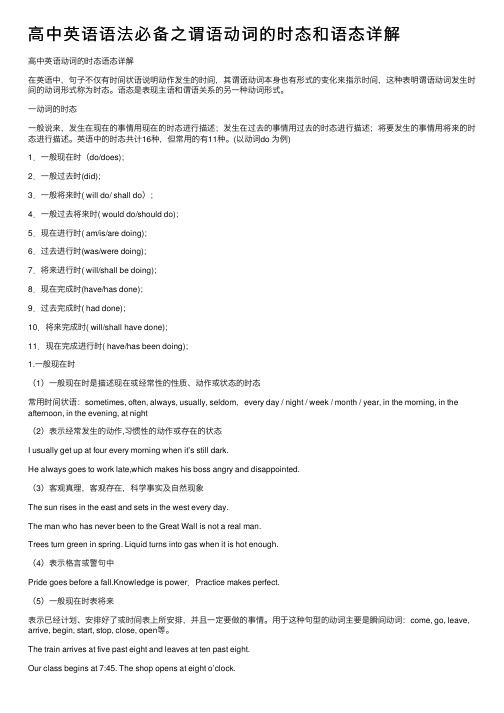
⾼中英语语法必备之谓语动词的时态和语态详解⾼中英语动词的时态语态详解在英语中,句⼦不仅有时间状语说明动作发⽣的时间,其谓语动词本⾝也有形式的变化来指⽰时间,这种表明谓语动词发⽣时间的动词形式称为时态。
语态是表现主语和谓语关系的另⼀种动词形式。
⼀动词的时态⼀般说来,发⽣在现在的事情⽤现在的时态进⾏描述;发⽣在过去的事情⽤过去的时态进⾏描述;将要发⽣的事情⽤将来的时态进⾏描述。
英语中的时态共计16种,但常⽤的有11种。
(以动词do 为例)1.⼀般现在时(do/does);2.⼀般过去时(did);3.⼀般将来时( will do/ shall do);4.⼀般过去将来时( would do/should do);5.现在进⾏时( am/is/are doing);6.过去进⾏时(was/were doing);7.将来进⾏时( will/shall be doing);8.现在完成时(have/has done);9.过去完成时( had done);10.将来完成时( will/shall have done);11.现在完成进⾏时( have/has been doing);1.⼀般现在时(1)⼀般现在时是描述现在或经常性的性质、动作或状态的时态常⽤时间状语:sometimes, often, always, usually, seldom,every day / night / week / month / year, in the morning, in the afternoon, in the evening, at night(2)表⽰经常发⽣的动作,习惯性的动作或存在的状态I usually get up at four every morning when it’s still dark.He always goes to work late,which makes his boss angry and disappointed.(3)客观真理,客观存在,科学事实及⾃然现象The sun rises in the east and sets in the west every day.The man who has never been to the Great Wall is not a real man.Trees turn green in spring. Liquid turns into gas when it is hot enough.(4)表⽰格⾔或警句中Pride goes before a fall.Knowledge is power.Practice makes perfect.(5)⼀般现在时表将来表⽰已经计划、安排好了或时间表上所安排,并且⼀定要做的事情。
英语语法——动词

动词1)表示动作中状态的词叫做动词。
2)根据其在句中的功能,动词可分为四类,分别是:实义动词(Notional Verb)、系动词(Link Verb)、助动词(Auxiliary Verb)、情态动词(Modal Verb)。
说明:有些情况下,有些动词是兼类词,例如:We are having a meeting.我们正在开会。
(having是实义动词。
)He has gone to New York.他已去纽约。
(has是助动词。
)3)动词根据其后是否带有宾语,可分为两类,分别是:及物动词(Transitive Verb)、不及物动词(Intransitive Verb),缩写形式分别为vt. 和vi.。
说明:同一动词有时可用作及物动词,有时可用作不及物动词。
例如:She can dance and sing.她能唱歌又能跳舞。
(sing在此用作不及物动词。
)She can sing many English songs.她能唱好多首英文歌曲。
(sing用作及物动词。
)4)根据是否受主语的人称和数的限制,可分两类,分别是:限定动词(Finite Verb)、非限定动词(Non-finite Verb)例如:She sings very well.她唱得很好。
(sing受主语she的限制,故用第三人称单数形式sings。
)She wants to learn English well.她想学好英语。
(to learn不受主语she的限制,没有词形变化,是非限定动词。
说明:英语中共有三种非限定动词,分别是:动词不定式(Infinitive)、动名词(Gerund)、分词(Participle)。
5)根据动词的组成形式,可分为三类,分别是:单字词(One-Word Verb)、短语动词(Phrasal Verb)、动词短语(Verbal Phrase)例如:The English language contains many phrasal verbs and verbal phrases.英语里有许多短语动词和动词短语。
初中英语人教版 中考 语法专题 10 动词的时态和语态
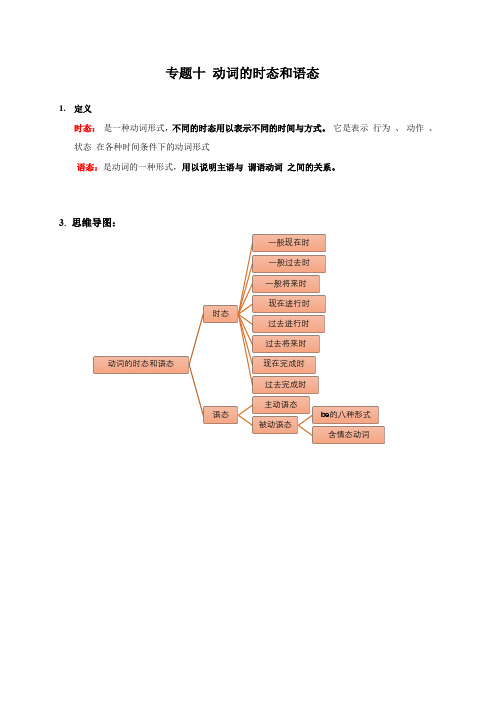
专题十动词的时态和语态1.定义时态:是一种动词形式,不同的时态用以表示不同的时间与方式。
它是表示行为、动作、状态在各种时间条件下的动词形式语态:是动词的一种形式,用以说明主语与谓语动词之间的关系。
3. 思维导图:动词的时态和语态时态一般现在时一般过去时一般将来时现在进行时过去进行时过去将来时现在完成时过去完成时语态主动语态被动语态be 的八种形式含情态动词1.动词的时态1.常考的时态构成及用法a.一般现在时d.现在进行时e.过去进行时f.过去将来时g.现在完成时h.过去完成时2. 动词的语态a. 分类:主动语态:表示主语是动作的执行者被动语态:表示并语是动作的执行者c.主动语态和被动语态的转换规则典型例题总分:50分姓名:得分:1.单选题(每小题1分,共50分)( ) 1. Jenny, together with the Greens the White Tower Park if it tomorrow.A.are going to; isn't rainyB.is going to; doesn't rainC.are going to; won't rainD.is going to; isn't rain( ) 2. The old man for quite some time.A.has diedB.dieC.has deadD.has been dead( ) 3. It is reported that a tall building in the city next year.A.will be builtB.were buildC.have builtD.will build( ) 4. My sister for 2 years.A.has marriedB.have got marriedC.has been marriedD.married( ) 5. Chinese ________in many schools around the world and many people love to learn it.A.teachesB.is teachingC.has taughtD.is taught( ) 6. When Tom was in primary school, he ________the piano every day.A.playsB.playedC.was playingD.has played( ) 7. A baby's first month birthday is a special event in China and _____with a special Party.A.celebratesB.is celebratedC.was celebratedD.will celebrate( ) 8. -Were you at home at 9 o'clock last night?-Yes, I a shower at that time.A.tookB.was takingC.was takenD.am taking( ) 9. National Day celebrations for China's seventieth birthday in about three months.A.will be heldB.will holdC.is heldD.was held( ) 10. We don't know if he tomorrow. If he, I will call youA.will come, will comeB.will come, comeses, will comees, comes( ) 11. He told me that he ______ his uncle in Thailand the next day.A.will visitB.has visitedC.is going to visitD.would visit( ) 12. -Tom, do you know ________? -In Beijing.A.where will the 24th Winter Olympics be heldB.where the 24th Winter Olympics will holdC.where the 24th Winter Olympics will be heldD.where will the 24th Winter Olympics hold( ) 13. Peter with his classmates ________ for the bus when the earthquake happened.A.is waitingB.was waitingC.are waitingD.were waiting( ) 14. his museum ________ here for over 80 years. It ________ one of the oldest buildings in this city.A.is; wasB.had been; isC.was; has beenD.has been; is( ) 15. -Mrs. Brown, how long can books from the school library ?-At most two weeks.A.borrowB.keepC.be borrowedD.be kept( ) 16.-An AI robot _____in our school dining hall next term.-I'm looking forward to it.A.will useB.will be usedC.is usedD.was used( ) 17. Usually a baby's face ____ smooth.A.is feelingB.feltC.feels likeD.feels( ) 18. She _____ an English magazine when I came in.A.readsB.has readC.will readD.was reading( ) 19. I will call you as soon as he______ here.A.arriveB.will arriveC.arrivesD.arrived( ) 20. Boys and girl, ______ learning and have fun!A.keepB.to keepC.keepingD.kept( ) 21. There ______a basketball game between these two grades in the gym this afternoon.A.willB.is going to haveC.is going to beD.will have( ) 22. We ______TV from seven to nine last night.A.were watchingB.will watchC.watchedD.watch( ) 23. Jack's mother taught me how ________ Yunnan rice noodles last weekend.A.to makeB.makingC.makeD.to making( ) 24. Mrs. Green said the plates ________ right away,or they would become difficult to wash.A.will be washedB.should washC.will washD.should be washed( ) 25. The documentary Under the Dome (《苍穹之下》)which ________ by Chai Jing showed us that the air pollution in China was very serious.A.producesB.producedC.is producedD.was produced( ) 26. -What did you do last night?- I ________ my homework and watched TV.A.didB.doC.am doingD.will do( ) 27.The hospital is very famous. It _______ in 2001.A.buildsB.builtC.was builtD.is built( ) 28.These rules are made the disabled.A.protectB.protectedC.to protectD.protecting( ) 29. -How much does the TV ?-Not too much. It's just a second-handed one.A.costB.spendC.takeD.pay for( ) 30. -Have you ever ________ an amusement park?- Yes, I have ________ Fun Times Amusement Park last year.A.been to, have gone toB.gone to, have been toC.go to, went toD.been to, went to( ) 31.We are glad to hear that the terrorists ________ by the brave policemen several days ago.A.are caughtB.were caughtC.have been caughtD.are going to be caught ( ) 32. -Why didn't you go to the party last night? - Because I _____.A.wasn't invitedB.didn't invitedC.haven't invitedD.don't invited ( ) 33. -What _____ you supposed ____ when you are in China?- You should shake hands.A.are, to doB.do, to doC.are, doingD.have, to do( ) 34. So far, we ________ English for three years.A.have learntB.learnC.learntD.had learnt( ) 35.The boy was made ______ the words again and again.A.copyB.copyingC.copiesD.to copy( ) 36. The sports meeting in our school now.A.being heldB.is havingC.is holdingD.is being held( ) 37. The window ____ ten minutes ago, and the room is bright now.A.can be cleanedB.is cleanedC.was cleanedD.will be cleaned( ) 38. -Oh, Mrs. King, your necklace looks nice. Is it new?-No, I _______ it for 2 years.A.hadB.have hadC.boughtD.have bought( ) 39. He has ordered a watch on line for his father and it _______ to him before Father's Day.A.sendB.will be sentC.was sentD.sent( ) 40. There ______ a funny cartoon on CCTV 6 this evening.A.willB.will haveC.is going to beD.is going to have( ) 41. -________ did your uncle leave his home town? -He ___________ for nearly twenty years.A.When, has leftB.When, has been awayC.How long, has leftD.How long, has been away ( ) 42. My uncle ________ Germany on business many times.A.has been onB.has gone toC.has been toD.has been in( ) 43. Her life ________ a lot during the last three years.A.changedB.changingC.has changedD.will change( ) 44. -Lisa was seen ______ an old man go across the street this morning. -What a kind girl she is!A.helpingB.helpedC.to helpD.helps( ) 45. My computer has broken down. I'll get it _______ this afternoon.A.repairsB.repairedC.to repairD.repairing。
专升本语法——动词

动词
动词
动词概述
动词的基本 形式
动词的分类
动词的时态 语态
动词的语气
1. 动词概述
动词(Verbs)是最复杂的一种词类。 既可表示动作,又可表示状态; 有人称和数的变化,而且必须与主语的人
称和数保持一致; 它还有一些特有的语法特征,如时态,语
态和语气。 动词可分为四类:实义动词/ 助动词/ 系动词/
现在分词的构成
情况
例词
一般在动词原形后直接加-ing go-going, study-studying
以不发音的-e结尾的词,去-e加 live-living, move-moving -ing
以-ie结尾的词,变-ie为-y,再 die-dying, lie-lying, tie-tying 加-ing
词变-y为-i,再加-es
try-tries
过去式和过去分词的构成
情况
例词
一般在动词原形后加-ed
work-worked, play-played
以-e结尾的词后加-d
like-liked, change-changed
以“辅音字母+-y”结尾的词变-y cry-cried, copy-copied,
2.接复合宾语的及物动词
有些及物动词可以接复合宾语(宾语+宾语补足语)。 常见的这类动词有:ask, call, believe, consider, choose, elect,
hear, have, imagine, think, get, find, feel, keep, leave, make, name, prove, push, order, teach, tell, wish等。 e.g. He kept us alive.他使我们活了下来。
英语动词的时态讲解
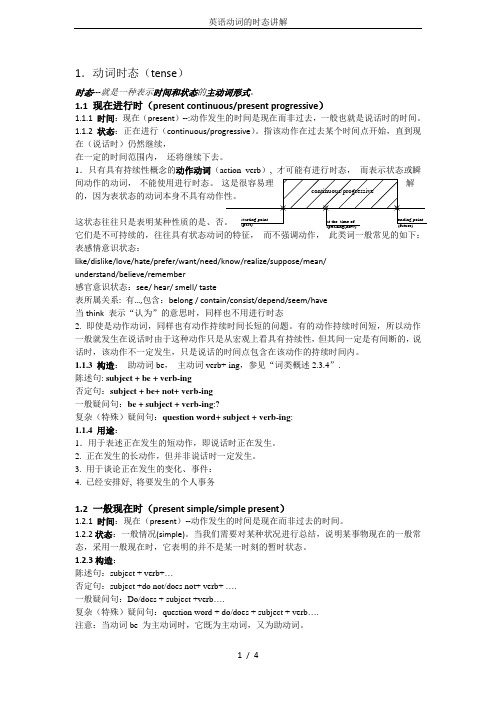
1.动词时态(tense )时态---就是一种表示时间和状态的主动词形式。
1.1 现在进行时(present continuous/present progressive )1.1.1 时间:现在(present )--:动作发生的时间是现在而非过去,一般也就是说话时的时间。
1.1.2 状态:正在进行(continuous/progressive )。
指该动作在过去某个时间点开始,直到现在(说话时)仍然继续,在一定的时间范围内, 还将继续下去。
1.只有具有持续性概念的动作动词(action verb ), 才可能有进行时态, 而表示状态或瞬间动作的动词, 不能使用进行时态。
它们是不可持续的,往往具有状态动词的特征, 而不强调动作, 此类词一般常见的如下: 表感情意识状态:like/dislike/love/hate/prefer/want/need/know/realize/suppose/mean/understand/believe/remember感官意识状态:see/ hear/ smell/ taste表所属关系: 有…,包含:belong / contain/consist/depend/seem/have当think 表示“认为”的意思时,同样也不用进行时态2. 即使是动作动词,同样也有动作持续时间长短的问题。
有的动作持续时间短,所以动作一般就发生在说话时由于这种动作只是从宏观上看具有持续性,但其间一定是有间断的,说话时,该动作不一定发生,只是说话的时间点包含在该动作的持续时间内。
1.1.3 构造: 助动词be , 主动词verb+ ing ,参见“词类概述2.3.4”.陈述句: subject + be + verb-ing否定句:subject + be+ not+ verb-ing一般疑问句:be + subject + verb-ing :?复杂(特殊)疑问句:question word+ subject + verb-ing :1.1.4 用途:1.用于表述正在发生的短动作,即说话时正在发生。
(完整)高中英语语法(时态和语态)
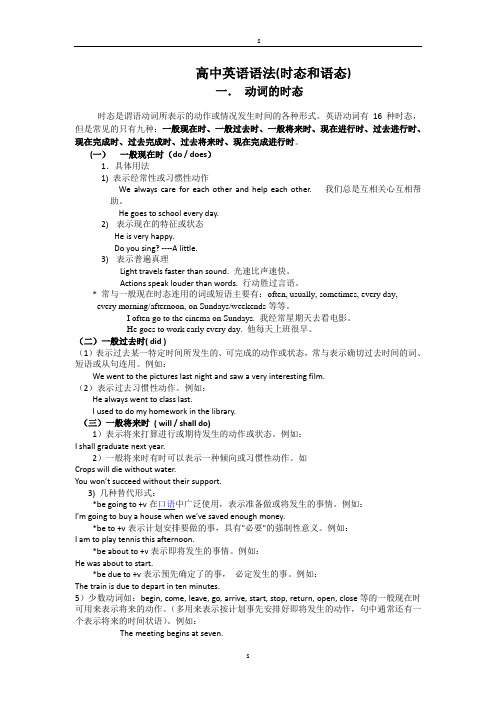
高中英语语法(时态和语态)一.动词的时态时态是谓语动词所表示的动作或情况发生时间的各种形式。
英语动词有16种时态,但是常见的只有九种:一般现在时、一般过去时、一般将来时、现在进行时、过去进行时、现在完成时、过去完成时、过去将来时、现在完成进行时。
(一)一般现在时(do / does)1.具体用法1) 表示经常性或习惯性动作We always care for each other and help each other. 我们总是互相关心互相帮助。
He goes to school every day.2)表示现在的特征或状态He is very happy.Do you sing? ----A little.3)表示普遍真理Light travels faster than sound. 光速比声速快。
Actions speak louder than words. 行动胜过言语。
* 常与一般现在时态连用的词或短语主要有:often, usually, sometimes, every day,every morning/afternoon, on Sundays/weekends等等。
I often go to the cinema on Sundays. 我经常星期天去看电影。
He goes to work early every day. 他每天上班很早。
(二)一般过去时( did )(1)表示过去某一特定时间所发生的、可完成的动作或状态,常与表示确切过去时间的词、短语或从句连用。
例如:We went to the pictures last night and saw a very interesting film.(2)表示过去习惯性动作。
例如:He always went to class last.I used to do my homework in the library.(三)一般将来时( will / shall do)1)表示将来打算进行或期待发生的动作或状态。
- 1、下载文档前请自行甄别文档内容的完整性,平台不提供额外的编辑、内容补充、找答案等附加服务。
- 2、"仅部分预览"的文档,不可在线预览部分如存在完整性等问题,可反馈申请退款(可完整预览的文档不适用该条件!)。
- 3、如文档侵犯您的权益,请联系客服反馈,我们会尽快为您处理(人工客服工作时间:9:00-18:30)。
If you say or write nonstandard verb forms like the ones in the sentences above, you will likely be judged by the conjugation of your verbs and not the content of your character. It is a universal feeling that people who speak nonstandard English are not considered educated or employable.
BORN TO CONJUGATE?
I have wrote a book that needs editing. The forms have already went to the president’s office. I should have did the right thing by apologizing. The mail carrier hasn’t came yet. I seen you at the Earth, Wind, and Fire concert.
BARE/INFINITIVE -s Form (Present) -ing (Present Participle) -ed (Past) -en (Past Participle – used with has, have, had, and other helping verbs) type types typing typed typed text texts texting texted texted write writes writing wroosing the Right Time (the Right Tense) and the Right Mood
I like to read books I wish I had (wrote, written). Restricted use of this verb form It is important that each student (submit, submits) all papers on time. Subjunctive mood - importance The Writing Lab tutor told us that all right (is, was) two words. Present tense – general truth Macbeth (is, was) written by William Shakespeare; it (is, was) a play in which the king (is, was) a tragic hero. Historical past tense and literary present tense The Help by Katherine Stockett (is, was) a remarkable novel that (gives, gave) a realistic portrayal of the lives of maids in the South in the sixties. Sequence of tenses/ present tense for literature
7
NEW VERBS
Google portmanteau and find out what it means. Google Googles Googling Googled (have) Googled I’ll friend you on Facebook. friend friends friending friended (have) friended
In that article, the author (examined, examines) several causes of crime. Literary present My history professor reminded us that the Hitler diaries (are, were) not authentic. Literary present If I (was, were) a rich person, I’d still buy lottery tickets and clip coupons from the paper. Subjunctive mood - wish
9
Choosing the Right Time (the Right Tense) and the Right Mood
The professor has already (went, gone) over the course requirements. Restricted use of this verb form The syllabus requires that each student (write, writes) three papers and take two essay tests. Subjunctive mood requirement
2
VERB FORMS
Use the past participle form with a helping verb (is, are, was, were, has, have).
PRESENT come do drag dream drive drink go see shine shrink strive swim write PAST came did dragged dreamed, dreamt drove drank went saw shone shrank, shrunk strived, strove swam wrote PAST PARTICIPLE (has) come (has) done (has) dragged (has) dreamed, dreamt (has) driven (has) drunk (has) gone (has) seen (has) shined, shone (has) shrunk (has) strived, striven (has) swum (has) written
6
MOOD
Mood enables verbs to express attitudes, intentions, commands, wishes, recommendations, and possibilities. COMMANDS Place all assignments in the dropbox by the deadline. WISHES I wish I were rich. If I were the professor, I would give all of my students an A. RECOMMENDATIONS It is important that everyone be on time.
1
VERB FORMS
Every English verb except “be” has 5 forms, which vary depending on whether the verb is REGULAR (changes its form in a regular/standard way such as “type” and “text”) or IRREGULAR (changes its forms in an irregular way such as “write”).
4
UWF WRITING LAB RULES OF THUMB FOR VERB FORMS AND TENSES
From Real Good Grammar, Too by Mamie Webb Hixon
5
TENSE
Tense refers to the ability of verbs to indicate the time of an action. IN REAL TIME Class starts now. IN HABITUAL OR RECURRING TIME The class meets on Mondays from 5:00 till 8:30 p.m. A GENERAL TRUTH The university offers undergraduate and graduate courses. IN THE PAST Classes were cancelled last Friday because of inclement weather. CONTINUING ACTION Enrollment in online classes is increasing each year. IN THE FUTURE The university will be closed during Thanksgiving holidays.
8
Choosing the Right Time (the Right Tense) and the Right Mood
The professor has already (went, gone) over the course requirements. The syllabus requires that each student (write, writes) three papers and take two essay tests. In that article, the author (examined examines) several causes of crime. My history professor reminded us that the Hitler diaries (are, were) not authentic. If I (was, were) a rich person, I’d still buy lottery tickets and clip coupons from the paper.
